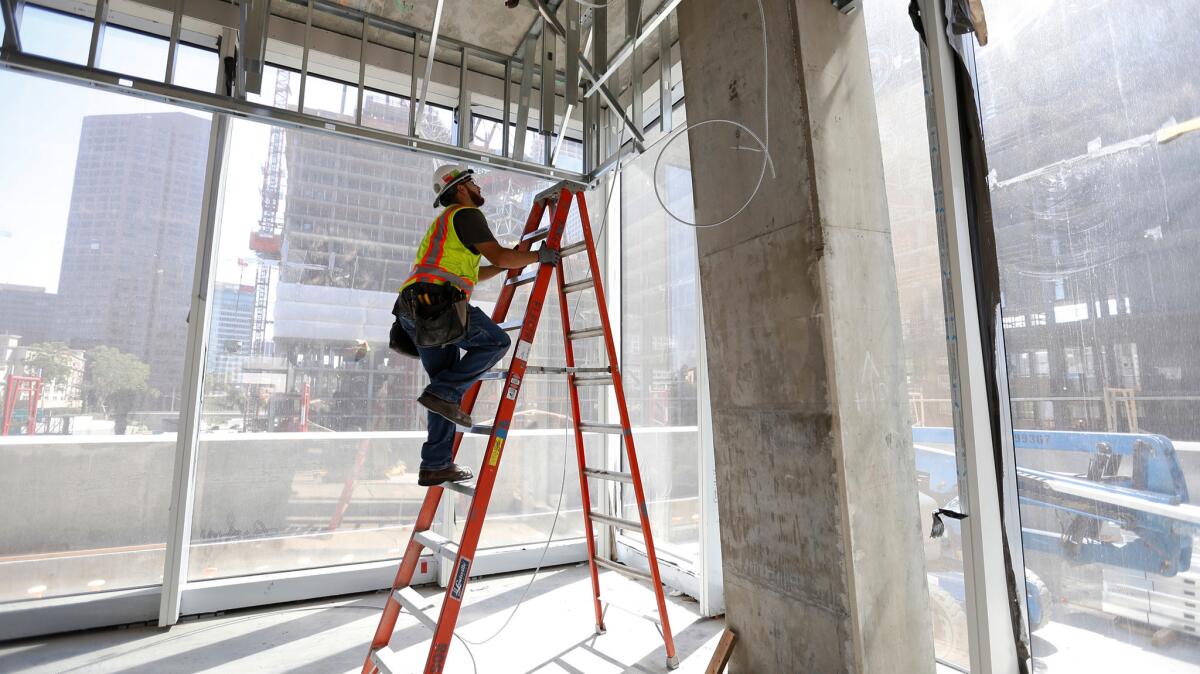California lawmakers delay climate change vote amid push for affordable housing

Reporting from Sacramento — While conversations over climate change have dominated recent debate at the Capitol, California lawmakers are accelerating bills to address the state’s housing affordability crisis, and may vote on a series of measures before they break for summer recess next Friday.
The move comes after progressive Democrats in the Assembly balked at approving an extension to cap and trade, the state’s landmark program to fight climate change, without also addressing housing problems.
Gov. Jerry Brown, Senate President Pro Tem Kevin de León (D-Los Angeles) and Assembly Speaker Anthony Rendon (D-Paramount) announced a cap-and-trade deal Monday that would strengthen the state’s air quality rules and extend through 2030 the program that forces businesses to pay to pollute. The three had hoped for a vote late Thursday to comply with a new rule approved by voters requiring legislation to be publicly available for 72 hours before final action is taken.
De León and Rendon said in a joint statement Wednesday that moving the vote to Monday will avoid a late-night floor debate and “will also allow our discussion on long-term housing affordability solutions in California to catch up to the climate effort.”
For two years, Brown and lawmakers have discussed increasing funding for low-income housing and reducing local government barriers to development, but have yet to reach any major decisions. Evan Westrup, a spokesman for Brown, called the current housing discussions “productive.”
The governor has been pushing lawmakers to approve a cap-and-trade extension this year, and wants a two-thirds supermajority vote in the Legislature to insulate the decision from potential legal challenges. But some legislators have been reticent to embrace the plan, with many wanting to address the state’s housing problems first.
“Housing is the biggest problem facing the state of California,” said Assemblyman Todd Gloria (D-San Diego), one of the Assembly Democrats pushing for faster action on housing. “While climate change, of course, is an existential threat, we can do both. We need to do both. This rescheduling I think is a reflection of the fact that the concerns that we have voiced are being heard and addressed.”
While legislative leaders said housing was the reason for the cap-and-trade delay, there were other concerns that pushed back the vote. A faction of Republican lawmakers who have been active in negotiations had concerns about how a key priority for them, a tax credit for manufacturers, was written into the legislation. They also sought more specific details on how the revenues from the cap-and-trade program would be spent.
Brown, De León and Rendon didn’t say what might be part of a housing package. But high-profile bills introduced this year include a new $75 fee on real estate transactions to raise roughly $250 million a year in low-income housing subsidies, a $3-billion low-income housing bond to be put before voters in 2018, a measure allowing cities to require developers to build low-income housing in their apartment projects and a bill forcing cities that have fallen behind on state goals for home building in their communities to ease development regulations.
One complication in the housing debate is that the funding bills also require two-thirds votes to pass. Democrats hold supermajorities in both houses of the Legislature, but have waning interest in making such decisions, especially after agreeing to hike gas taxes in April. Extending cap and trade and boosting low-income housing funding could mean at least two more supermajority votes.
Brown and lawmakers, however, are nailing down key details in housing legislation in anticipation of a larger deal. This week, they’re finalizing an agreement with the state construction workers union, a major interest group influencing both the housing and cap-and-trade discussions, over provisions in Senate Bill 35, said Cesar Diaz, political director of the State Building & Construction Trades Council of California.
That legislation, from Sen. Scott Wiener (D-San Francisco), would eliminate multiple local planning reviews for individual projects that met certain zoning and affordability standards. Under the deal with the union, Diaz said, projects of more than 10 units that qualify for expedited approval will have to pay union-level wages to construction workers, and developers of some larger projects also will have to agree to union-standard work rules or apprenticeship programs.
Diaz said the union is going to throw its weight behind a housing deal, including more funding for low-income development.
“We’re working collaboratively with both houses, the Assembly, the Senate and the governor’s office to get an entire package done,” he said.
Wiener, whose bill passed the Senate last month, said he anticipated a vote on his legislation in the Assembly “as early as next week.”
“It is my hope we will be voting on housing funding bills as well,” Wiener said.
Times staff writer Melanie Mason in Sacramento contributed to this report.
ALSO
Updates on California politics
More to Read
Get the L.A. Times Politics newsletter
Deeply reported insights into legislation, politics and policy from Sacramento, Washington and beyond. In your inbox three times per week.
You may occasionally receive promotional content from the Los Angeles Times.











